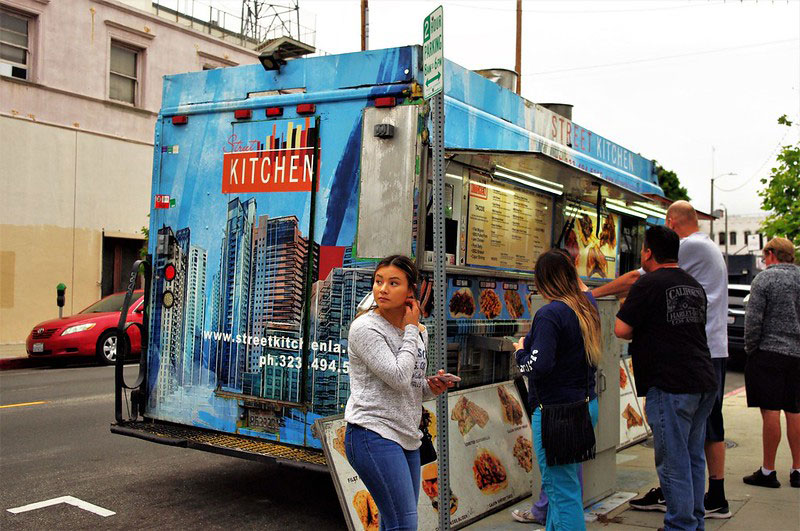
This article is the second in a series of articles that NPQ, in partnership with Hispanics in Philanthropy, will publish in the coming weeks. (You can read the first article here.) The series brings forward the voices of Latinx leaders within the nonprofit and philanthropic sectors to share their experiences on a range of economic justice issues that affect Latinx communities.

For decades, Los Angeles was one of the only major cities in the United States where street vending was illegal. The beloved entrepreneurs who bring life to our streets with their food and merchandise have long been criminalized, and many still feel unsafe. They have also been disproportionately devastated by COVID-19.
In recent years, however, street vendors have organized, achieving a major victory in getting their legal status recognized by the Los Angeles city council in 2018. Now, to create a more just and equitable recovery, it is critical to build on that victory. Street vendors, in short, must not only be part of our economic development plans but centered at their foundation.
For the last 12 years, I’ve had the privilege of working with some of the most talented and passionate community-based leaders in Los Angeles. This collective, the LA Street Vendor Campaign, is a mix of street vendors and organizational allies who have worked to uplift the rights of micro-entrepreneurs who sell food and merchandise on sidewalks.
In 2009, Inclusive Action (then called Leadership for Urban Renewal Network, or LURN) researched how communities were responding to the “Great Recession” of 2008. We were inspired by the street vendors in East Los Angeles. Our research indicated that many were being criminalized and most were operating their businesses as a primary way of maintaining their households. Back then, Los Angeles was one of the only major cities in the country without a permit system for sidewalk vendors. Without permits or any other form of “legal” framework, street vendors were cited, arrested, and had their equipment (e.g., food trucks) confiscated. Their attempts to build their businesses were stunted, and in some cases, permanently canceled.
In response, the LA Street Vendor Campaign came together to advocate for the legalization of street vending. We hosted town halls across the city and spent countless hours educating lawmakers about the contributions of street vendors. Working with the vendors, we together built a multi-neighborhood leadership network and organized large public actions that engaged Angelenos and educated them about street vendor needs. As a result of this work, and what felt like endless public hearings, we succeeded in legalizing street vending in 2018. The campaign’s success was not limited to Los Angeles; our work also advanced legislation that decriminalized street vending statewide and set a baseline for legalization in other cities.
Key Lessons
At the press conference celebrating the legalization of street vending in 2018, Caridad Vasquez, a founder of the LA Street Vendor Campaign and one of our most passionate street vendor leaders, told me, Mijo, creciste con nosotros—my son, you grew with us.
Yes, I certainly did grow with the campaign. In the 10 years leading up to the victory, and in our work since, I’ve learned important lessons that I think could be important principles, not just for organizing campaigns, but for building a lasting economic recovery. Among these are the following:
- Those who are most impacted should lead. The LA Street Vendor Campaign was successful because street vendors, with their wealth of perspectives and experiences, led the way. Street vendor leaders sat on the campaign’s “steering committee” and made final decisions at every critical juncture in the multi-year organizing and legislative process. When the proposal’s opponents wanted to meet, vendors were there; when a councilmember wanted to meet, street vendors led the conversation. When a portion of the policy was edited and there was an opportunity to make an amendment, street vendors made the final decision. There were many moments where street vendors were critical to opening dialogue and exploring options that organizational allies initially could not see. I believe their perspectives made the campaign more powerful and the policy development smarter.
- Partnerships built on trust can move quickly and effectively. The partners that make up the campaign are people I’ve worked with for years, and the relationships we’ve cultivated cut across personal and professional boundaries. We push each other, defer to each other, and stand with each other, even in trying times. This trust has allowed us to move quickly during moments that require urgent action. We trust each other to make decisions, we delegate to each other to maximize limited resources, and we ask for help when we need it. This trust is not often found in other coalitions, and without it, even making simple decisions could be tedious.
- With limited resources, a wide network can amplify an important message. The campaign’s steering committee manages day-to-day work on the campaign, but during key moments, we activate a wide network across Los Angeles to support street vendors. This broader coalition was key for major public hearings, as the network of committed organizations may not be able to commit to weekly meetings or actions, but it can certainly mobilize their bases for a few hearings a year. These partners also opened doors to elected officials who we couldn’t reach ourselves, and they connected us to other key figures who helped move our agenda.
Challenges and Opportunities
Despite the victories, “legalizing” street vending is just the beginning of the work. As expected, implementing the policy victory to ensure that street vendors benefit has not been easy. As any organizer knows, it is one thing to win at city council and quite another to make those gains stick with city staff and officials.
It is no surprise that advocating for proper investment for street vendors and the campaign’s vision for economic development strategies that included them has been an uphill battle for the last two years. The city of Los Angeles invested only $350,000 into an education program for the estimated 50,000 street vendors but allocated over $3,000,000 for enforcement.
Sign up for our free newsletters
Subscribe to NPQ's newsletters to have our top stories delivered directly to your inbox.
By signing up, you agree to our privacy policy and terms of use, and to receive messages from NPQ and our partners.
Within a few months of the city launching its new permit program on January 2, 2020, the COVID-19 pandemic dealt a devastating blow to street vendors. Elected leaders used the emergency health order as justification to ban all unlicensed street vendors. This action vitiated the city’s promised six-month moratorium on enforcement to give these entrepreneurs a chance to comply with the newly implemented program.
Many city and county leaders saw in street vendors a threat to public health. Even as leaders would tout and promote small businesses, outdoor dining, and takeout as ways to keep the economy thriving, low-income street vendors—the original “take-out” food businesses—were left out and further marginalized. When the city announced its “LA Al Fresco” program that allows brick-and-mortar businesses to use sidewalks to offer outdoor dining, street vendors were an afterthought and are still not meaningfully included.
In the face of these issues, the lessons and expertise we’ve acquired through the LA Street Vendor Campaign have continued to lead our work. Case in point, the campaign’s leadership distributed over $1,000,000 in cash assistance to street vendors and their communities in the last year alone. Street vendor leaders quickly activated their networks to support undocumented street vendors who had not received government relief and needed financial support. Our trusted organizational partners which were key to this success—especially Community Power Collective, East LA Community Corporation, and Public Counsel—leveraged their expertise as community organizers, program managers, and legal experts, to raise awareness about the vulnerability of street vendors.
We also succeeded in advocating for a new county pilot program that is bringing street vendors and designers together to develop an affordable, food code-compliant street vending cart. And the LA Street Vendor Campaign has hosted vaccine clinics to reach street vendors who have limited access to the tools necessary to book an online appointment.
Street Vendors are at the Heart of Rebuilding the Economy
Look at the economic rebuilding plan of your own community, and I am going to hazard a guess that street vendors are not a significant part of it. But this is an enormous oversight and a huge problem. Fundamentally, an economy that works for all is one where all community members can prosper and, when necessary, create jobs for themselves.
This is not new—street vending has been a US tradition for centuries. For many community members today, as in the past, street vending offers the opportunity to generate an income when other economic opportunities are scarce. Street vendors are innovators who not only create jobs but also contribute to their neighborhoods by making streets safer and more vibrant—“eyes on the street,” as the renowned urbanist Jane Jacobs once famously put it.
But to ensure that street vendors and other small businesses have a secure place in our economy, we’ll need to be intentional about advocating for them. Many systems in place do not serve workers, low-income entrepreneurs, and their families; therefore, we need targeted advocacy to change them.
What’s more, good policy must be paired with transformative and well-funded economic development initiatives that support microentrepreneurs who want to move into the formal economy where they can work and earn a living in peace. Low-interest microlending programs, community-oriented technical assistance programs, and economic relief initiatives need to be paired with advocacy, so communities can get support today and build an environment that fosters their long-term prosperity.
To accomplish this, the public, private, nonprofit, and philanthropic sectors need to work together. The lessons I’ve learned from the LA Street Vendor Campaign—be led by the most impacted, build trust with mission-oriented partners, and establish a wide network of amplifiers and influencers—are just a few of the values I think could apply to all sectors. Philanthropy must invest as never before, with the goal of systemic change as opposed to preserving endowments. Governments must also reprioritize their investments and be unapologetic about equity. Indeed, if street vendors are to be truly integrated into our economies, principles of equity must guide all our investments and that means prioritizing the most vulnerable in all decisions, not just some.
Rudy Espinoza is the executive director of Inclusive Action for the City (formerly LURN), a community development organization that serves as a laboratory for innovations in economic development and community building.












